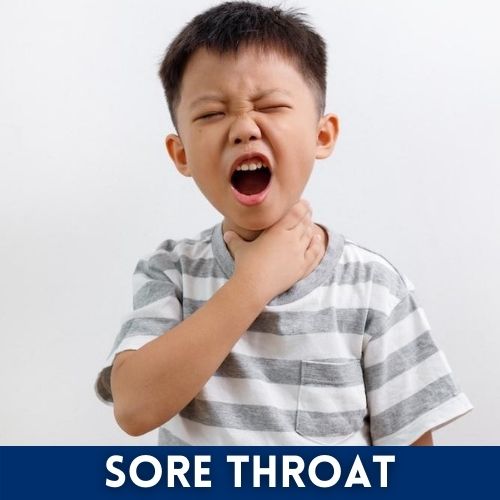Specialized center for Sore Throat
A sore throat is pain, scratchiness or irritation of the throat that often worsens when you swallow. The most common cause of a sore throat (pharyngitis) is a viral infection, such as a cold or the flu. A sore throat caused by a virus resolves on its own.
THE LIFE PLUS HOSPITAL Care is COVID 19 Safe
- Our Hospital premises are COVID safe
- Regular sanitization of clinic & hospital premises
- Immediate medical assistance through Online Consultation
Specialized center for Sore Throat
A sore throat is pain, scratchiness or irritation of the throat that often worsens when you swallow. The most common cause of a sore throat (pharyngitis) is a viral infection, such as a cold or the flu. A sore throat caused by a virus resolves on its own.
THE LIFE PLUS HOSPITAL Care is COVID 19 Safe
- Our Hospital premises are COVID safe
- Regular sanitization of clinic & hospital premises
- Immediate medical assistance through Online Consultation

Sore Throat
What is a sore throat?
A sore throat is a painful, dry, or scratchy feeling in the throat.
Pain in the throat is one of the most common symptoms.
Most sore throats are caused by infections, or by environmental factors like dry air. Although a sore throat can be uncomfortable, it’ll usually go away on its own.
Sore throats are divided into types, based on the part of the throat they affect:
- Pharyngitis affects the area right behind the mouth.
- Tonsillitis is swelling and redness of the tonsils, the soft tissue in the back of the mouth.
- Laryngitis is swelling and redness of the voice box, or larynx.
Let's Schedule Your Appointment
Treatment

Treatment
A sore throat caused by a viral infection usually lasts five to seven days and doesn’t usually require medical treatment. Antibiotics don’t help treat a viral infection.
To ease pain and fever, many people turn to acetaminophen (Tylenol, others) or other mild pain relievers.
Consider giving your child over-the-counter pain medications designed for infants or children, such as acetaminophen (Children’s Tylenol, FeverAll, others) or ibuprofen (Children’s Advil, Children’s Motrin, others), to ease symptoms.
Never give aspirin to children or teenagers because it has been linked to Reye’s syndrome, a rare but potentially life-threatening condition that causes swelling in the liver and brain.
Our Doctor
Why The Life Plus Hospital?
 The Life Plus Hospital is COVID-19 safe
The Life Plus Hospital is COVID-19 safe
Your safety is taken care of by thermal screening, social distancing, sanitized clinics, and hospital rooms, sterilized surgical equipment, and mandatory PPE kits during surgery.
 Medical Expertise With Technology
Medical Expertise With Technology
Our Doctors spend a lot of time with you to diagnose your condition. You are assisted in all pre-assisted Hospitalisation process. We offer advanced laser and laparoscopic surgical treatment. Our procedures are USFDA approved.
 Assisted Surgery Experience
Assisted Surgery Experience
A dedicated Medical Coordinator assists you throughout the surgery journey from insurance paperwork, to free commute from home to hospital & back and admission-discharge process at the hospital.
 Post Natal Care
Post Natal Care
We offer free follow-up consultations and instructions including dietary tips as well as exercises to every patient to ensure they have a smooth recovery to their daily routines.
The Life Plus Hospital in Numbers
Years Of Expertise
Successful Surgeries
Consultation
Success Rate
Symptoms
Symptoms of a sore throat can vary depending on the cause. Signs and symptoms might include:
- Pain or a scratchy sensation in the throat
- Pain that worsens with swallowing or talking
- Difficulty swallowing
- Sore, swollen glands in your neck or jaw
- Swollen, red tonsils
- White patches or pus on your tonsils
- A hoarse or muffled voice
Infections causing a sore throat might result in other signs and symptoms, including:
- Fever
- Cough
- Runny nose
- Sneezing
- Body aches
- Headache
- Nausea or vomiting
When to see a doctor
Take your child to a doctor if your child’s sore throat doesn’t go away with the first drink in the morning, recommends the American Academy of Pediatrics.
Get immediate care if your child has severe signs and symptoms such as:
- Difficulty breathing
- Difficulty swallowing
- Unusual drooling, which might indicate an inability to swallow
If you’re an adult, see your doctor if you have a sore throat and any of the following associated problems, according to the American Academy of Otolaryngology-Head and Neck Surgery:
- A sore throat that is severe or lasts longer than a week
- Difficulty swallowing
- Difficulty breathing
- Difficulty opening your mouth
- Joint pain
- Earache
- Rash
- Fever higher than 101 F (38.3 C)
- Blood in your saliva or phlegm
- Frequently recurring sore throats
- A lump in your neck
- Hoarseness lasting more than two weeks
- Swelling in your neck or face
Causes
Viruses that cause the common cold and the flu also cause most sore throats. Less often, bacterial infections cause sore throats.
Viral infections
Viral illnesses that cause a sore throat include:
- Common cold
- Flu (influenza)
- Mono (mononucleosis)
- Measles
- Chickenpox
- Coronavirus disease 2019 (COVID-19)
- Croup — a common childhood illness characterized by a harsh, barking cough
Bacterial infections
Many bacterial infections can cause a sore throat. The most common is Streptococcus pyogenes (group A streptococcus) which causes strep throat.
Other causes
Other causes of a sore throat include:
- Allergies. Allergies to pet dander, molds, dust and pollen can cause a sore throat. The problem may be complicated by postnasal drip, which can irritate and inflame the throat.
- Dryness. Dry indoor air can make your throat feel rough and scratchy. Breathing through your mouth — often because of chronic nasal congestion — also can cause a dry, sore throat.
- Irritants. Outdoor air pollution and indoor pollution such as tobacco smoke or chemicals can cause a chronic sore throat. Chewing tobacco, drinking alcohol and eating spicy foods also can irritate your throat.
- Muscle strain. You can strain muscles in your throat by yelling, talking loudly or talking for long periods without rest.
- Gastroesophageal reflux disease (GERD). GERD is a digestive system disorder in which stomach acids back up in the food pipe (esophagus).Other signs or symptoms may include heartburn, hoarseness, regurgitation of stomach contents and the sensation of a lump in your throat.
- HIV infection. A sore throat and other flu-like symptoms sometimes appear early after someone is infected with HIV.Also, someone who is HIV-positive might have a chronic or recurring sore throat due to a fungal infection called oral thrush or due to a viral infection called cytomegalovirus (CMV), which can be serious in people with compromised immune systems.
- Tumors. Cancerous tumors of the throat, tongue or voice box (larynx) can cause a sore throat. Other signs or symptoms may include hoarseness, difficulty swallowing, noisy breathing, a lump in the neck, and blood in saliva or phlegm.
Rarely, an infected area of tissue (abscess) in the throat or swelling of the small cartilage “lid” that covers the windpipe (epiglottitis) can cause a sore throat. Both can block the airway, creating a medical emergency.
Risk factors
Although anyone can get a sore throat, some factors make you more susceptible, including:
- Age. Children and teens are most likely to develop sore throats. Children ages 3 to 15 are also more likely to have strep throat, the most common bacterial infection associated with a sore throat.
- Exposure to tobacco smoke. Smoking and secondhand smoke can irritate the throat. The use of tobacco products also increases the risk of cancers of the mouth, throat and voice box.
- Allergies. Seasonal allergies or ongoing allergic reactions to dust, molds or pet dander make developing a sore throat more likely.
- Exposure to chemical irritants. Particles in the air from burning fossil fuels and common household chemicals can cause throat irritation.
- Chronic or frequent sinus infections. Drainage from your nose can irritate your throat or spread infection.
- Close quarters. Viral and bacterial infections spread easily anywhere people gather, whether in child care centers, classrooms, offices or airplanes.
- Weakened immunity. You’re more susceptible to infections in general if your resistance is low. Common causes of lowered immunity include HIV, diabetes, treatment with steroids or chemotherapy drugs, stress, fatigue, and poor diet.
Prevention
The best way to prevent sore throats is to avoid the germs that cause them and practice good hygiene. Follow these tips and teach your child to do the same:
- Wash your hands thoroughly and frequently for at least 20 seconds, especially after using the toilet, before and after eating, and after sneezing or coughing.
- Avoid touching your face. Avoid touching your eyes, nose or mouth.
- Avoid sharing food, drinking glasses or utensils.
- Cough or sneeze into a tissue and throw it away, and then wash your hands. When necessary, sneeze into your elbow.
- Use alcohol-based hand sanitizers as an alternative to washing hands when soap and water aren’t available.
- Avoid touching public phones or drinking fountains with your mouth.
- Regularly clean and disinfect phones, doorknobs, light switches, remotes, and computer keyboards. When you travel, clean phones, light switches, and remotes in your hotel room.
- Avoid close contact with people who are sick or have symptoms.
Tell us about your problems and we’ll figure out the best treatment option for you.
Life Plus hospital
Women and Child Care Hospital in Indiranagar | LifePlus Hospital
At Life plus hospital, we offer a comprehensive range of women’s health services. The Department is managed by highly experienced lady gynecological doctors who offer specialized attention and compassionate care for women
Let's Schedule Your Appointment
Sore Throat Faq's
Yes. Strep throat is highly contagious. Strep throat is highly contagious.
Close contact with airborne droplets of an infected individual is the most common way of catching Streptococcus infection.
Rheumatic fever











